 I Can’t Believe It’s Not Butler
I Can’t Believe It’s Not Butler
We all think we know what a butler is: the traditional, stiff starched fellow perpetually dressed for dinner who expresses himself only by the occasional raising of an eyebrow. In fact, the role has evolved a great deal over the years, and there are many different types of butler with a wide range of roles and responsibilities. With some still occupying the stereotype to a greater or lesser extent and others somewhat more relaxed, it can be a varied and exciting role with the right candidate clicking into place in the right household.
To start with the more traditional butlers, some of what you think you know from Downton Abbey is, in fact, true. They do still exist – although are somewhat rarer than they used to be – and are still in demand in more formal households. They’re likely to have been formally trained as a butler, and their role centres around service – they might answer the door, oversee events, dinners and parties, and have the final word on table settings and management of the wine cellar. They’ll be known for their invisible presence, and be formally attired.
A more modern approach to butlering is much more common these days. The role is much more varied, and whilst they might well still have service-related responsibilities they will undoubtedly be hands-on with a range of other tasks. Naturally these vary enormously depending on the particular household or principals, but might include duties such as general housekeeping, administrative tasks such as diary management, organising events, dealing with bills and paperwork, chauffeuring and even security. Some will be required to travel internationally with the family, particularly if they have yachts or multiple properties overseas.
A modern-style butler might still dress formally either on special occasions or at all times, but it’s more common for them to adopt normal business attire, or even casual clothes, depending on their employers’ guidelines on dress code or household uniforms.
Regardless of the level of formality, a butler is usually a high-ranking position within a household and therefore will often have some responsibility for hiring, training and managing other staff.


According to the long-established stereotype, butlers have usually been men. In today’s more equal world, this is no longer the case and female butlers are more commonplace. This is particularly true for – but by no means limited to – female principals, who want a right-hand-lady as their number one member of staff.
Regardless of tone and level of formality, gender, dress code or gamut of duties, butlers have much in common. First and foremost is their dedication to the family they serve, and from this stems their attention to detail, commitment to providing impeccable service, and perhaps above all else, discretion.
 Pembury Partners secure positions for the world’s finest butlers, and indeed all other members of household staff.
Pembury Partners secure positions for the world’s finest butlers, and indeed all other members of household staff.







